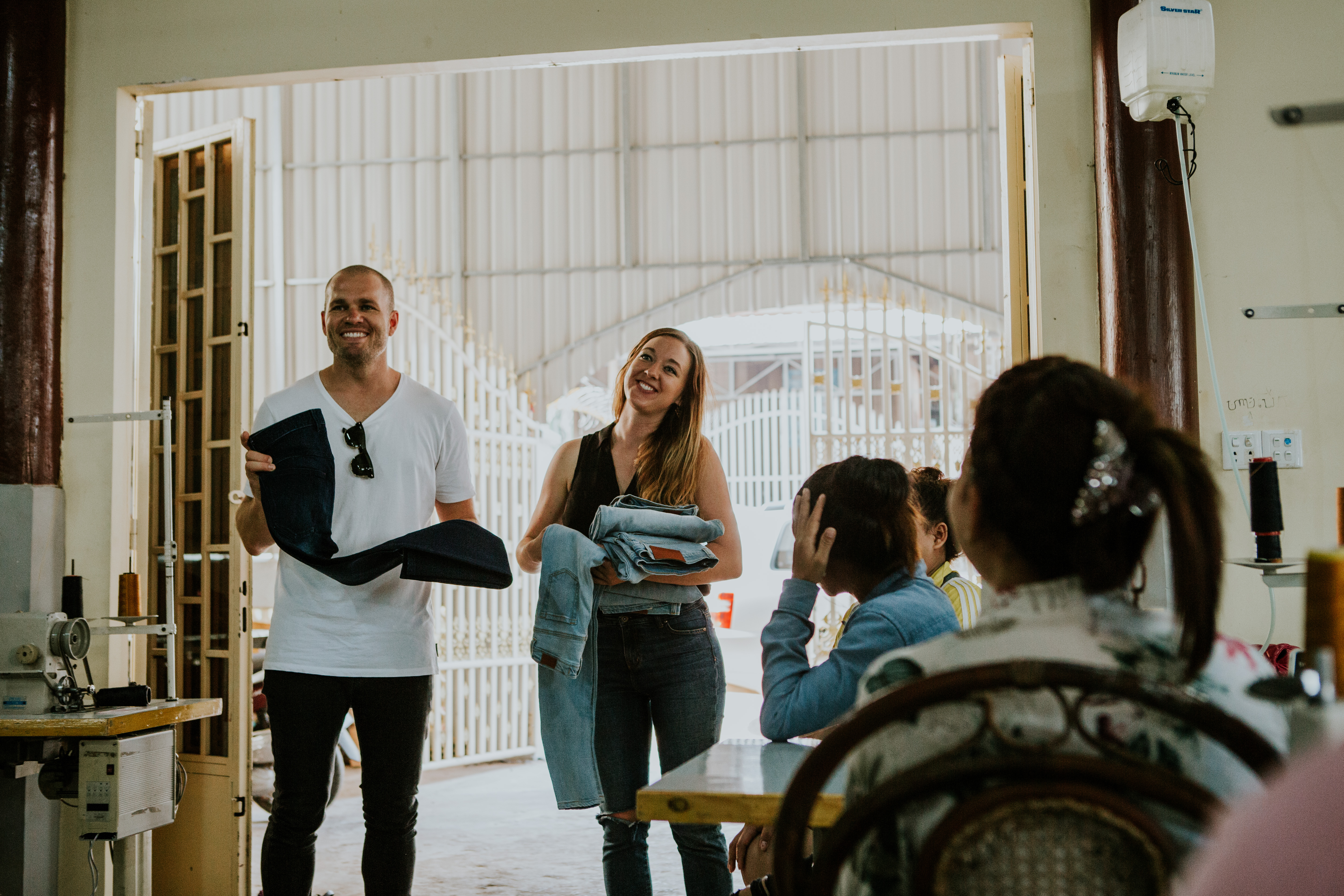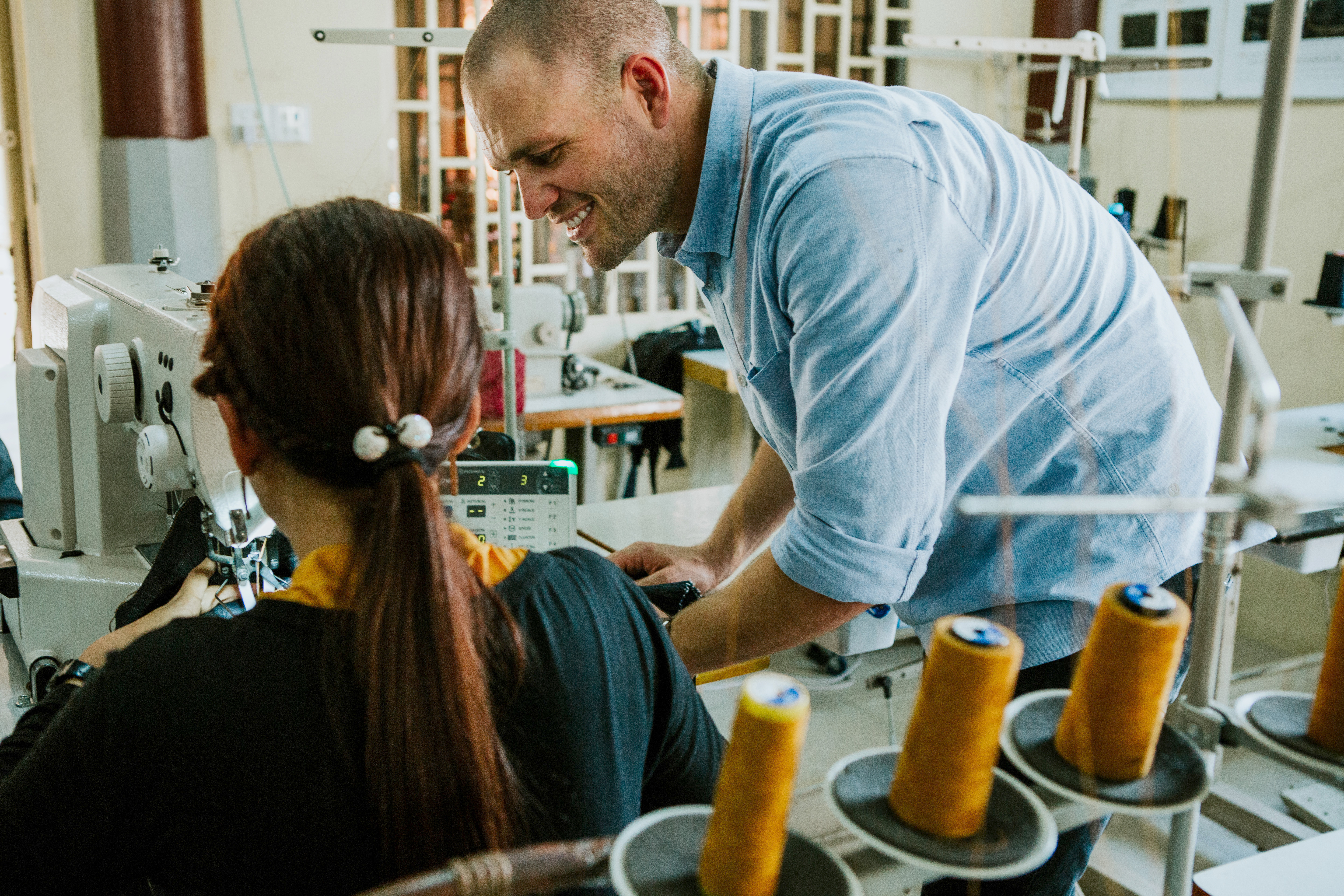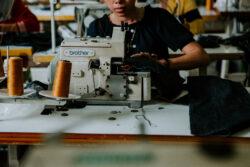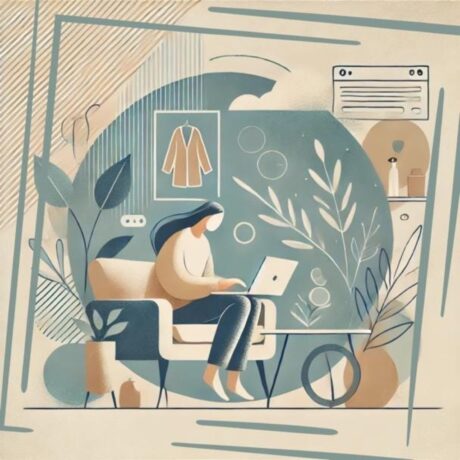Fashion Revolution caught up with James Bartle, founder and CEO of Outland Denim.
In November, Fashion Revolution caught up with the founder and CEO of Outland Denim who was in London for the Stop Slavery Awards which were part of the 2018 Trust Conference. Outland Denim was shortlisted for an award, the only fashion brand on the list. Apple won. But Outland Denim, which was set up to provide meaningful employment – and in many cases, liberation from the sex trafficking trade – for vulnerable women in Cambodia won the ultimate prize this year when the Duchess of Sussex chose to wear their jeans on several occasions during her visit to Australia and New Zealand in October. The Markle sparkle resulted in her high rise jeans selling out and the brand’s socially responsible #zeroexploitation hashtag being talked about around the world.
In tangible terms, the brand was able to employ 15 more women almost overnight. The Markle effect opened doors in the most positive way, and highlighted not only the power – the responsibility – women like Markle have to spread the right message through their clothes, but also how a brand with a true mission to use fashion for positive good is the only way to do business. We wanted to know more about what makes this business tick.
Tamsin Blanchard: So, how did Meghan Markle come to be wearing Outland Denim jeans?
James Bartle: I would have thought that someone with as much power as she has – and she’s very well aware of the power she has – would be very careful about the brands she would align with and why she would wear them. So for us we would like to think that:
1) she’s pregnant so she wore our product because it is comfortable and we saw her wear them time and time again on her tour of Australia, but also 2) because our brand values align entirely with her own personal ones.
TB: She would have found a message on the pocket inside, a signature of your product. Is that written by the seamstress who made the jeans?
JB: So there’s a range of seamstresses that will work on the product and would have chosen to write a message inside and it will be printed on the pocket. It’s a really powerful part of the product, especially when somebody buys it and doesn’t realise what’s behind the brand and one day they are washing their jeans and they read this message.
It’s about reinforcing the message we want to communicate – which is very similar to Fashion Revolution, it’s the same: Who Made My Clothes? How were they treated in the process of making your clothes? And then how has this product impacted the environment around it? That’s why we exist, to change some of the wrongs the fashion industry has created and be able to show there is a better way of producing fashion.
TB: And that would have really struck a chord with Meghan, I’m sure. It’s the idea you can love these jeans, they are really comfortable but every time you put them on there’s a ripple effect.
JB: On a social level there’s a massive ripple effect which flows out well beyond the goal of making. It flows out into families, it flows out into culture into the way its reestablishing dignity in this woman as she goes into the community. There are so many tentacles that come off being able to give this kind of employment to somebody and this framework around them to equip them to be successful.
It all comes back to the product and it has to be a beautiful premium product and nobody can be exploited in the process of that. We spent five years developing this before we launched our brand, it’s that stuff that sets a solid foundation that someone as incredible as Meghan Markle would choose to wear the product.

TB: What were the biggest challenges in those five years you took to set up the brand?
JB: So many challenges. Bringing a woman in who has no understanding of the fashion industry or the garment industry and teaching her to make one of the most difficult garments in the entire industry – and not just make a part of it but make the entire thing. That’s probably one of the most difficult things, getting quality where it needs to be.
But also, what’s the structure of our business model so it genuinely gives them the power to change their entire life? From the day we employed them we had to pay living wages which is different to minimum wages so its a huge cost to bring them in and train them over a two and a half year period into being able to make the entirety of a jean.
Then there’s education. We teach languages, about finance, budgeting, how to manage your money, all the way through to infant care.
Those four major pillars of our business model were the hardest thing to establish because we didn’t know what needed to be there and what didn’t need to be there.
We were over paying when we first started which created other issues. It’s very important to not pity the women and I guess we started in that way, we felt sorry for them and wanted to do anything to help them out but that wasn’t really helping. That’s like giving donations, although good, they are just Band-aids. We really wanted a business model that genuinely changed their lives, and this one does.
TB: What were the issues around over paying?
JB: On a micro level, that causes inflation. So you’re setting people up for failure: you are now used to earning way more than you will ever earn in this country and therefore you are dependant on us to be able to maintain the lifestyle you’ve now built so it was one of the most destructive things you could do. The key is living wages. That’s where you start. We have five different levels of pay and they are classified on things like punctuality, attitude at work, quality of work, speed of work and as they get better they move up that pay scale. So there is a genuine career to follow. And then they become section leaders, and managing sections of the facility and that’s a huge thing. They probably never thought they could have that opportunity which means now they could leave if they ever need to and go somewhere else and be more skilled than the competition they might face. It genuinely brings about cultural change. It’s insanely powerful.
TB: You are promoting women into leadership roles which has an amazing effect.
JB: We know that by giving women freedom and equipping them with the tools they need that will bring way more stability than equipping men. This isn’t something new. If that’s the desire for them we want to be able to facilitate that so they can enjoy those experiences as well.
TB: What is the living wage in Cambodia?
JB: In Cambodia it changes depending on the region you are in. We have two facilities you have one in Phnom Penh, the capital, which needs to be more there and then we’ve got one in Kampong Cham which is less.
Absolutely as you work your way up if there’s no ceiling to that, that’s fantastic. But you don’t just deserve that, it comes from hard work and commitment.
Kampong Cham is out in the provinces. If you set up in the city, a lot of these women are having to move to an area where they would not necessarily be able to go and see their family and often they will never see their family, it’s too far away. So it’s important to have it out there many as women come from that area still get to see their families. We’ve just opened the one in the city as well and that one is offering entirely different opportunities. In that one we have men working as well, whereas in the other one we just have two men.
The new one is a finishing facility, so we got a full team of experts. As we add people into the mix, they will learn way faster and we will have a better quality of product.
TB: And the experts are men?
JB: The experts are men because they come from the wash industry so we’ve got a guy who moved from Turkey who is working on R&D with washing and sustainability. As you know, washing is one of the worst parts of the whole process so to be able to adopt that along with the equipment we’ve bought in which is laser and ozone technologies, reducing water right down, reusing water versus discharging, working on plant based water filtration and management. The goal for us isn’t just how we minimise our footprint, it’s how do we eradicate our footprint? And until we all start looking at it from that angle, the problem will never leave.
TB: It’s so complex, to properly really think through every step of the way…
JB: It’s only hard for the first ones. How do we go and just recreate how it’s done and make that normal? And there are enough brands now who are saying we don’t think about it from an industry point of view of how it’s done. Our team were entirely inexperienced in this. We’ve got eight years experience now, which is so minimal but we haven’t been shaped by anything the industry has put to us. We had no idea how to do this and that’s been our strength.

TB: Similar to the Veja story. They didn’t know how to make trainers and worked out what made sense from the start.
JB: Ignorance is good, it’s the reason we started in denim, we’d have never have done it otherwise. I didn’t even know denim was so bad for the environment, I had no idea when we started.
TB: In terms of your cotton supply chain, how do you know there isn’t any slave labour along the way?
JB: You will never ever 100 per cent know. That’s impossible based on the smoke and mirrors of not knowing the farmer who grew the cotton and it is always a possibility. For us we need to be able to follow the tiers all the way back so we work with Bossa Denim in Turkey so we can go to the broker and back to the farm. So we can visit farms. We have the addresses so we can go and visit, so as much as you can guarantee that much of the supply chain with the stage we are at with technology… at the Trust conference they were showing this incredible stuff from Planet – every 24 hours there’s a satellite image of the entire planet which means we could potentially watch a crop and the way it’s been harvested. Incredible! If we could pinpoint our farm and watch on a daily basis… we are also looking at Supima cotton based in US, DNA imprints on the fibres so we know it came from that farm. That still doesn’t mean there is no slavery or exploitation of somebody somewhere.
TB: But you are doing your damnedest to make sure…
JB: Zero exploitation is our hashtag and that’s our commitment. We will work until the day we die to make sure no one or anything is exploited in the process. And one of the realisations we had is that means the person who sells the product; that means the customer, we don’t want to exploit them for their money if it’s not a beautiful product; we don’t want the sales associate to take a smaller margin; we don’t want the influencer to not be paid for wearing our product and showing their audience about us. It makes it really expensive to do, but that’s how business should work. Good business, everyone wins.
TB: So with Meghan Markle, you hit the jackpot.
JB: Yes and it takes something like that for us to be able to help each other grow and grow this movement.
TB: It must have been so great for your seamstresses.
JB: Not that every woman who works for us has been trafficked. We will filter in women who have stable lives and that’s really important to making this powerful. But again because sex traffic is part of it, it’s a very shameful thing in Cambodia, people could automatically be labelled with that.
TB: Do you know how many women you have diverted from slavery?
JB: We have 75 seamstresses and a large percentage – 80 percent come from vulnerable backgrounds which could mean they have a disability or were on the street. The last intake was 15 women and girls and it will probably be more. They really were employed because Meghan Markle wore the product. And it’s not just because of a spike in sales, that would be ludicrous. It’s because of doors globally opening and some of that is forecasting from what will come from it.
TB: How did you deal with the spike in sales?
JB: Unfortunately you are not really prepared for that. If you were you could sell so much. But we were fine, no website crashed. We had things we had to sort out on the fly, we had to send an email to everyone who pre-ordered jeans to say ‘hey, really sorry they are not going to be ready ‘til April, we can give you a refund if you’d like it’. There were very few people that wanted refunds. People are still ordering. Sales have plateaued now but people are pre ordering product that isn’t yet available based on that she sold it out for us. She is incredible.
TB: It must be quite a responsibility for her. It’s a lot of pressure. While there are so many positive messages she – and other influential women – can spread through their clothes, you don’t want to be wearing the wrong thing either.
JB: I don’t know whether she’d really realised the impact. How could she? But the impact is so deep. I wish I could let her meet some of those women who are there because of her! I don’t know that she would know that. It’s insane.









